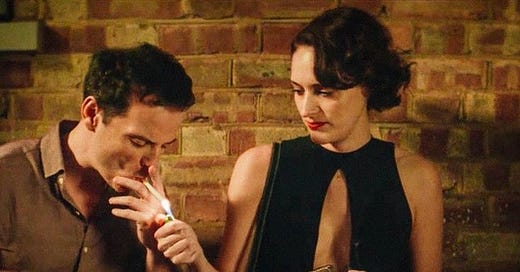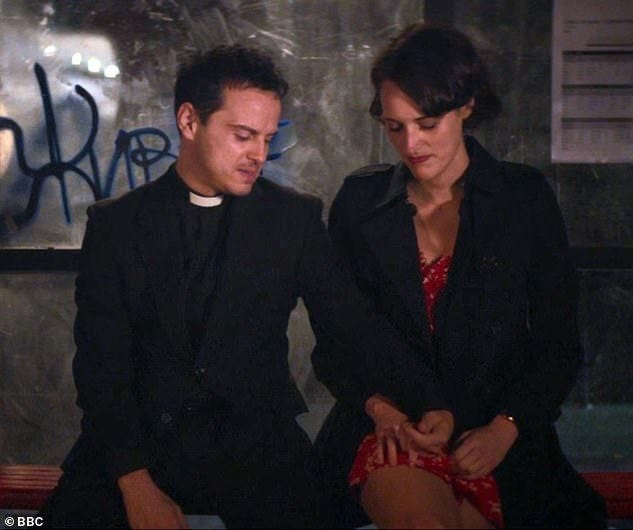Let me start by saying this: Fleabag is my all-time favourite show. I’ve lost count of how many times I’ve watched it, and each rewatch hits just as hard as the first. So, here I am again, watching it for the umpteenth time, and I’m floored, as always, by the kneel scene. You know the one. The one that’s unbelievably hot. Andrew Scott’s “Hot Priest” is all magnetic stares and dangerous tension, and when they finally kiss, it’s electric. But underneath that heat, there’s something far more raw and gut-wrenching going on.
Fleabag, up until this point, has used humour and sex like armour. It’s how she protects herself from the emotional mess she’s been carrying around—grief, guilt, loneliness. But in this scene, that armour cracks. She kneels before the Priest, admitting her depression, her loneliness, her deep sadness. It’s one of the most vulnerable moments we’ve seen from her, and she’s essentially asking, "Can you see me? Can you handle this?"
The act of kneeling itself is such a powerful visual. In one simple movement, she’s showing us exactly where she is emotionally: completely exposed, surrendering herself to the possibility of being understood. Kneeling can symbolize submission, a cry for mercy, even prayer. In this moment, Fleabag’s on her knees as though she’s pleading not just for comfort, but for something deeper—maybe even redemption or rescue. It’s as if she’s asking the Priest to save her from herself.
And what does he do? He kisses her.
Yes, it’s sexy. Undeniably so. But it’s also heart breaking. This moment of passion is gorgeous on the surface, but there’s something missing. Fleabag isn’t just asking for physical intimacy—she’s asking for emotional connection. She’s offering up her deepest, rawest self, hoping to be truly seen and understood. But instead of meeting her in that vulnerability, the Priest responds with desire. It’s easier, more immediate, but it skips over the emotional connection she’s longing for.
This taps into something so universal: how often do we confuse physical desire for emotional closeness? How often do we lean into passion when what’s really needed is someone to sit with us in our pain, to say, "I see you, and I’m here"? Fleabag offers her heart, and what she gets in return is physical connection—not the emotional support she craves.
What makes this scene even more powerful is that the kneeling isn’t just about Fleabag’s vulnerability—it’s also about the power dynamics at play. By physically lowering herself, she’s putting her emotional neediness on full display. She’s at the mercy of the Priest’s reaction. And that’s where the heartbreak lies: she’s offered something deep, something fragile, and instead of holding that space for her, he defaults to what’s easier—what’s physical.
It raises questions we all need to think about: How often do we, in our own relationships, mistake passion for closeness? How often do we crave emotional connection and instead settle for something surface-level because it’s easier? Have you ever found yourself in a moment of vulnerability, offering up your deepest self, only to be met with something that feels shallow in comparison?
And let’s not forget the Priest’s perspective here. He’s struggling too. He’s battling his own conflict between desire and his commitment to celibacy. It’s not just Fleabag who’s vulnerable—he’s vulnerable too. He’s not rejecting her emotional needs out of cruelty or disinterest; he’s overwhelmed by his own feelings. It’s a deeply human reaction. And yet, that doesn’t make it any less sad. His desire wins out over the possibility of sitting with Fleabag in her pain.
As I rewatch Fleabag, this scene hits harder each time. It’s a reminder that while physical intimacy is easy, true emotional connection is much harder. It’s about staying present in someone’s vulnerability, being willing to hold space for their emotional messiness. How often do we avoid those hard conversations or moments of real connection because they’re uncomfortable, and instead, reach for something that feels more immediate, like desire?
So, let’s ask ourselves: How many times have we settled for physical intimacy because it’s easier than facing the discomfort of emotional vulnerability? How often are we choosing the excitement of being wanted over the deeper satisfaction of being understood? Fleabag’s kneel scene is as much about the thrill of desire as it is about the tragedy of missed emotional connection. And in the end, isn’t being understood—truly seen for who we are—the intimacy we’re all really searching for?
And with that, I’ll leave you to mull it over—like Fleabag herself said, “I just want someone to tell me how to live my life, Father.” But since life doesn’t come with easy answers (or a Hot Priest), I guess we’ll have to figure it out ourselves.
Until then, let’s keep asking for more than just passion—because we deserve to be seen.
Kathryn
(Joyful Sarcasm)








So much goodness here!!! I am still reeling from how exceptional Fleabag is… just insanely well done. 😭 And, love all of the questions you pose here!!! That kneel scene is SOOO hot 🥵 but you’re right, so many layers to it. Being truly seen/understood is such a massive thing, and passion can completely gloss over that. I know I am very guilty of covering up vulnerability with passion because I’m afraid to be truly seen. I do think that physical intimacy can be a part of being truly seen, but only when both partners are truly vulnerable in the first place. Thank you for sharing these thoughts!!! Definitely will linger with me, being vulnerable in my daily life is deff something I struggle with. 💛
A great read, thank you and wonderful insights into common human behaviours where the default is to avoid the uncomfortable and sit with the pain. @katie Delaney I think you might like this very much too ❤️